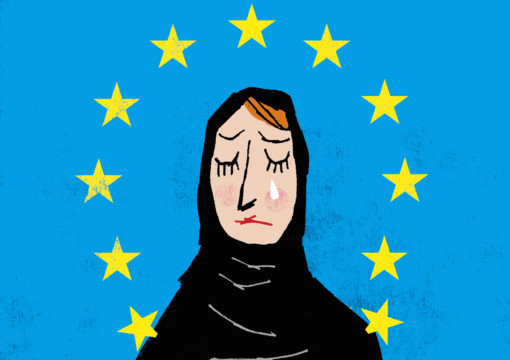
The attire of Muslim women is a theme that continues to spark controversy across the European world. Recently, there has been a remarkably swift backlash in France against a court ruling in favour of a Muslim employee of a private nursery school, who was fired after she refused to remove her headscarf.
French President Francois Hollande and his socialist government seem adamant to uphold former president Nicolas Sarkozy’s sleazy legacy to enforce restrictions on the attire of Muslim women.
The current parliamentarians were quick to condemn the court ruling as a threat to the principles of secularism despite the fact that during the election campaign, Hollande portrayed himself as a president for “all French citizens”. Paradoxically, he now seems to be pandering to staunch secularists and has called for further curbs on the headscarves which could result in a ban in private institutions. This has left a significant number of Muslims who voted for him disillusioned.
France already bans headscarves and other “ostentatious” religious symbols and from April 2011, banned the wearing of the niqab — a face-veil — in public places. Sarkozy argued at the time that it was “not welcome” in France and outlawing it “is to protect women from being forced to cover their faces and to uphold France’s secular values”. There are more than five million Muslims in France and fewer than 2,000 are believed to wear the niqab.
Over the last few years, a number of European countries have criticised Muslim attire, more specifically how the niqab is incompatible with their values and have therefore legislated restrictions that impose fines or imprisonment for those who break the law. It is argued that the niqab is a barrier to integration and communication, a security threat and it is not a religious requirement, but a cultural practice adopted by Muslim misogynists to suppress women.
Surely, if these European legislators were concerned with curbing the practice of forced face-covering, any legislation drafted should read: ‘A ban will be imposed on those women who are deemed forced to cover their face against their wishes’ rather than the current ban, which restrains the religious and personal freedom of Muslim women. Bans like this hark to the dark days of fascism rather than progressive and democratic societies.
There is no denying that in some parts of the world, women may be coerced into wearing the face-veil and this is wrong. However, there is no evidence to substantiate that this is the case in Europe. Most women who wear the veil in Europe do so as a sense of religious obligation. If women choose to cover then let it be their choice, why should anyone tell them how to dress? If women can choose to wear as little as they like, then they should also be able to choose to wear as much as they like.
The common rhetoric that the face-veil is not a religious requirement but a symbol of totalitarianism does not acknowledge the fact that within the Islamic law there is a difference of opinion amongst the scholars. Some Muslims believe that the niqab is compulsory, while others conclude it is recommended. They base their evidence on the interpretation of Quranic verses referring to the attire of Muslim women.
Europeans are proud of their traditions and values which include freedom of speech and the freedom to practice one’s religious beliefs. To ban any form of religious symbol — be it the Sikh turban, the Jewish Kippah or the Muslim attire — is incongruent with democratic values and reflects an undertone of secular fundamentalism. Liberal democracy is about respect for other cultures and religions. Banning Muslim women from wearing an item of clothing is just as oppressive as forcing them to wear it.
A new French poll revealed that more than 80 per cent of people said they would support a ban on the headscarf in private workplaces and schools. Proponents of such bans assert that this is to uphold the long-established principle of laicite — the separation of religion and state.
To me, imposing a ban on the attire of Muslim women is detrimental because: Firstly, it creates an “us” and “them” dichotomy, leading to further alienation in European societies. Secondly, it isolates and secludes the very women the ban is supposed to liberate. Treating innocent law-abiding women as criminals is not going to help with integration; instead it can alienate European societies.
I find it difficult to comprehend how the Muslim attire undermines democracy? Surely a democratic state is a fair and just society built upon the foundations of upholding the rights of others, respecting differences even if we disagree with, or dislike the choices that they may make.
In 2012, Amnesty International reported Muslim women are ‘denied jobs and girls prevented from attending regular classes just because they wear traditional forms of dress, such as the headscarf.’ Similarly, last year’s International Religious Freedom report documented that a rising number of European countries, including Belgium and France, restricting dress code adversely affected Muslims and others.
Why is Europe so besotted with the attire of the Muslim women when it is entrenched in a myriad of social, economic and political issues that have a greater impact on society? Or, have some of the Europeans lost their etiquettes of tolerance?
Sajda Khan is a British writer and a doctorate candidate, researching the relevance of Islam in contemporary society. You can follow her at www.twitter.com @SajdaKhanUK








